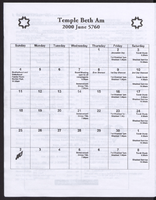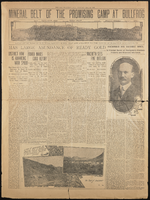Search the Special Collections and Archives Portal
Search Results

Juliana Urtubey oral history interview: transcript
Date
Archival Collection
Description
Oral history interview with Juliana Urtubey conducted by Nathalie Martinez and Barbara Tabach on May 24, 2021 for the Latinx Voices of Southern Nevada Oral History Project. Born in Colombia, Julia was able to immigrate with her family to the United States when she was six years old. The family lived in Chicago, Illinois and later in Phoenix, Arizona. Juliana moved to Las Vegas in 2013 and taught learners with special education needs at the elementary level. In 2021, she was named the National Teacher of the Year, the first Latina and the only Nevadan to ever hold the distinction. Juliana personally received the award from Dr. Jill Biden. Subjects discussed include: Colombia, Chicago, Illinois, National Teacher of the Year, and bilingual education.
Text

Alice Foley Yarish interview, August 31, 1993: transcript
Date
Description
An oral history interview conducted and edited by Robert D. McCracken; Esmeralda County History Project; Goldfield, 1993
Text

Charles Lee Hank III oral history interview: transcript
Date
Archival Collection
Description
Oral history interview with Charles Lee Hank III conducted by Claytee D. White and Barbara Tabach on April 10, 2019 for the Remembering 1 October Oral History Project.
Charles Lee Hank III describes his experience with police growing up in Chicago and the dichotomy he feels now as a police officer for the Las Vegas Metropolitan Police Department (LV Metro). Hank discusses the events of the October 1 shooting at the Route 91 Festival, the chaotic experience he and other officers experienced as they looked for the shooter in the Mandalay Bay, and the aftermath as a member of the Las Vegas community and as an officer of LV Metro.
Subjects discussed include: Las Vegas Strip Area Command.
Text
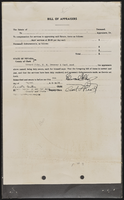
Stewart family real estate documents
Date
Archival Collection
Description
Stewart family real estate documents
Text
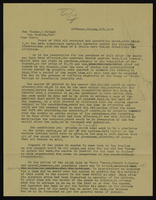
Correspondence, Levi Syphus to Thomas Toland
Date
Archival Collection
Description
Text
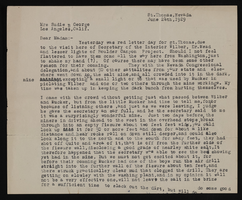
Correspondence, Levi Syphus to Sadie George
Date
Archival Collection
Description
Text
Dunes Hotel and Casino Records
Identifier
Abstract
The Dunes Hotel and Casino Records are comprised of administrative, publicity, and entertainment materials documenting the history of the Dunes Hotel and Casino in Las Vegas, Nevada from the years 1954 to 1992. Included are correspondence, contracts, photographs, hotel budgets, and an early aerial photograph of the property. The material provides a significant amount of historical documentation of the hotel that was long known to tourists and residents as the "the Miracle in the Desert."
Archival Collection
Dunes Hotel Photograph Collection
Identifier
Abstract
The Dunes Hotel Photographs (1950-1993) consist of administrative, publicity and entertainment images documenting the history of the Dunes Hotel and Casino in Las Vegas, Nevada. In addition to materials focusing on day-to-day activities at the hotel (correspondence, contracts, personnel, budgets, etc.) the collection provides insight into the hotel’s entertainment and public relations activities. Although there are chronological gaps in the collection, particularly during the later years of the Dunes (1970s-1990s), it provides a significant amount of historical documentation on the famed Strip hotel that was long known to tourists and residents alike as the “the Miracle in the Desert.”
Archival Collection

